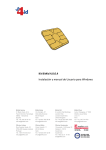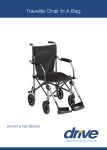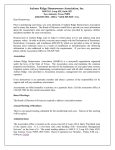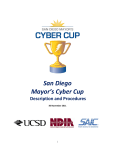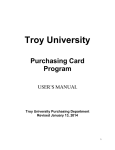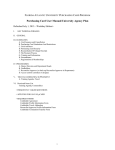Download Purchasing Card User Manual
Transcript
Purchasing Card Information Model cardholder instructions for agency and campus internal procedures May 2006 Introduction Welcome to the State of Wisconsin’s Purchasing Card Program. This user manual is designed to present the framework for implementing and managing a successful program in your agency or campus. It contains the hands-on detail management Program Administrators and individual cardholders need to know to make the program work effectively. Each agency and campus may customize these instructions for use with internal policies and procedures. For purposes of defining the control hierarchies for the card program, each agency represents a "company." Consequently, each agency and campus is responsible for administering the program at that level and should designate a person as the Purchasing Card Program Administrator to lead a team of purchasing and accounting personnel for program implementation and ongoing administration. Large agencies and campuses may have more than one individual to lead teams to administer the program. The official policies and procedures for the program are published in the State Procurement Manual, Section PRO-E-23, and the State Accounting Manual, Section V, Subsection 13. What Is a Purchasing Card? The purchasing card is a tool for agency employees to use to make low-dollar purchases for official agency business needs. It allows your agency head to delegate the authority to purchase low-dollar items directly to you to purchase supplies faster and more easily than before. You will no longer need to create a purchase requisition prior to buying qualifying items. Instead, you may purchase these low-dollar items ($5,000 and under) with a VISA credit card issued in your name. The VISA purchasing card payment system is an individual bill/central payment system. Cardholders receive a bi-weekly account statement for information and reconciliation purposes only. An electronic billing file including all charges and supporting detail is sent centrally to the accounting system. Accounting makes one payment to VISA on behalf of all cardholders. Expenditure transactions are processed through the state or campus accounting system and posted to the various accounting code combinations. In brief, a purchasing card is: • Authority granted by the agency head to individual state employees • For official state use only 1 • Authorized for purchases $5,000 and under • Authorized for purchases greater than $5,000 on statewide contracts where indicated or when approved by the State Bureau of Procurement and the State Controller’s Office • Authorized for use with only certain categories of merchants and commodities • Required for certain travel costs, including airline tickets, travel agency service fees, lodging, any applicable taxes and car rentals. May also be used for rental car gas, hotel and airport parking and other commercial transportation including trains, buses, taxis and shuttles. A purchasing card is NOT: • A means to avoid appropriate procurement or payment procedures • A card to access cash or credit • A right of employment • For cardholder personal use • For reimbursable meal costs. Individual meals are not allowed to be charged on the purchasing card. • For interagency or intra-agency use (except for retail purchases from any agency operation that sells goods to the public and accepts a charge card; e.g., Document Sales, campus bookstores, etc.). What Are the Benefits of a Purchasing Card? The purchasing card enables cardholders, purchasing and accounting staff to perform more effectively and focus on the value-added aspects of the job by reducing: • Time needed to purchase and receive supplies • Number of requisitions and purchase orders • Reimbursements from petty cash • Number of invoices and invoicing problems • Number of checks issued The purchasing card also offers the following cardholder benefits when used for travel: • Little or no out-of-pocket cost for authorized travel-related expenses • Travel and Emergency Assistance including medical and legal referral services, prescription assistance and emergency transportation assistance 2 • Auto Rental Collision Damage Waiver Program provides coverage for damage due to collision or theft of rental car • Lost luggage insurance up to $1,250 • Common Carrier Travel Accident Insurance up to $500,000 Who Are Likely Cardholders? Because the purchasing card allows the cardholder to place orders directly with the supplier, the greatest program benefits are achieved when cards are issued to end users. Therefore, in addition to the traditional buyers (purchasing staff), other staff who should be issued cards are: • Field staff and others in constant travel status, who may need emergency parts or supplies while on the road • Librarians/others who routinely buy subscriptions and books • Program support staff who buy supplies and arrange travel • Conference/trade show planners who may need to purchase supplies and equipment in other locations • Physical plant/maintenance staff • Mechanics, engineers How Do I Obtain a Purchasing Card? 1. Contact your agency or campus Purchasing Card Program Administrator. 2. Complete a Purchasing Card Application and Use Agreement (DOA-3584). This form is an example only. Please see your Purchasing Card Program Administrator for agency/campus-specific form. Your participation must be approved by management at the level required by your agency to grant purchasing approval for transactions $5,000 and under. 3. Attend a training session (either group or individual session). 4. Assist your Purchasing Card Program Administrator in completing the Account Setup Form provided by the card vendor. A card will be issued within a week after the form is submitted to US Bank. 5. Keep a copy of the Purchasing Card Application and Use Agreement. Your Program Administrator keeps the original application. 3 Personal Liability and Your Credit Rating The use of the purchasing card results in agency liability, NOT a personal liability for the cardholder. Your credit rating will not be affected. However, remember that you sign an agreement with your agency prior to receiving the card and as such you are responsible for any misuse of the card as outlined in this manual. The US Bank/VISA Purchasing Card Program provides liability protection to the State once notification of any loss, theft or fraudulent use is made. However, the same level of liability protection does not apply to cards that are made available to multiple users. Therefore, each purchasing card must be used only by the person whose name appears on the card. Guidelines for Card Use The purchasing card can be used to purchase low-dollar value items with the total amount of any purchase not to exceed $5,000 without prior approval from the State Bureau of Procurement and State Controller’s Office. Certain exceptions apply: • The Purchasing Card may not be used for cash advances (ATM machines) or to purchase non-business (personal) items/services. • In order to prevent difficulties in reporting to the IRS, the Purchasing Card should not be used for tax (1099) reportable services. It is acceptable to use the card for training, conference registrations and non-reportable services. If the purchasing card is used for reportable services, the agency is responsible for any tax (1099) reporting requirements that result. Merchant Category Code Standards All vendors are assigned a Merchant Category Code (MCC) by their bank. There are three state MCC standards for the purchasing card program: The State Merchant Category Code Exclusion Standard, the State Merchant Category Code Standard Specification for Travel and the State Foreign Emergency Major Medical Expense Standard. The Purchasing Card Program Administrator determines the MCC default for his/her agency or campus and modifies individual accounts as needed. Attempting to buy from merchants that are not included in the specifications assigned to your account will cause your transaction to be denied. Occasionally, a bank may have wrongly assigned a vendor’s MCC. If you run into a situation where your transaction is rejected for an appropriate purchase or if you need to have your default MCC modified for a specific business purpose, contact your Program Administrator. 4 Use with Statewide Contracts The purchasing card may be used on statewide contracts when the contract or subsequent amendment indicates that card use is allowed. Contact the contract administrator if you are aware of a contract vendor who accepts charge cards and the contract documentation indicates card use is not allowed. If an agency or campus authorizes a cardholder to make purchases on a state contract for more than $5,000, the Purchasing Card Program Administrator should notify the Enterprise Cards Program Administrator in the State Bureau of Procurement with an explanation of the steps it will take to ensure that the higher authorizations are limited to the specific contract purchases. The procedures for use on contracts are subject to change at any time. Be sure to consult the relevant contract before making any purchase with the card. General Instructions for Card Use 1. If the transaction value is more than $5,000, use traditional purchasing procedures and follow your agency-established process. 2. If the transaction value is $5,000 or less: Using best judgment, determine an appropriate vendor for the materials desired. Give the vendor your purchasing card account number and expiration date or present the card at the point of sale. Tell the vendor that the State is exempt from State sales taxes. NOTE: The Wisconsin Department of Revenue has issued a tax exempt number for each state agency. This number should appear on your card either as the second line of embossing (preferred) or in the printed logo. 3. If the material will be shipped or delivered, tell the vendor to enclose or mail a copy of the receipt/invoice with each shipment. Have the vendor mark it "Credit card order - paid" to avoid duplicate payments. If the material is picked up, obtain the itemized receipt indicating the purchase price. 4. Maintain a purchase record. See Purchasing Card Record (DOA-3585) for an example of a purchase record. 5. Retain the original receipts/shipping invoices. Guidelines for Card Use for Travel 5 A purchasing card must be used to pay for airline tickets, travel agency service fees, business-related lodging, any applicable taxes and contract car rentals. A purchasing card may also be used for rental car gas, hotel and airport parking, and other commercial transportation including trains, buses, taxis and shuttles. There are two ways to be set up as a cardholder for travel purposes: 1. As a general purchases and travel cardholder. Allows you to purchase supplies and charge travel-related expenses. 2. As a travel-only cardholder. Your card will be restricted to the travel-related Merchant Category Codes. Attempting to buy from merchants that provide goods/services other than those related to travel could cause your transaction to be denied. • Use of the purchasing card for travel does NOT exempt you from the State of Wisconsin travel guidelines (See the Uniform Travel Schedule Amounts, UTSA) nor from your agency/campus pre-approval policies and procedures for lodging and air travel. • Provisions in labor agreements for represented employees that apply to lodging expenses supersede the provisions in the Uniform Travel Schedule Amounts General Instructions for Card Use for Lodging 1. Always identify yourself as an employee of the State of Wisconsin and ask for government discounts/contract rate. 2. Lodging within the State of Wisconsin is exempt from taxes. Remember to give the establishment your agency or campus tax exempt number when checking in. 3. Only room charges for state employees may be put on the purchasing card. All other expenses such as meals, porterage, telephone calls, room service, laundry, etc., must be paid separately and appropriate reimbursement claimed on a travel voucher. 4. When you make reservations, be sure to check the hotel's cancellation policy. Generally, if you fail to cancel in accordance with hotel policy, you will be responsible for reimbursing your agency or campus for room charges that are posted to the purchasing card when you are a "no-show." 6 5. All lodging charges must be supported by the original machine-printed or original handwritten receipt furnished by the establishment. The receipt shall clearly indicate that only lodging was charged to the purchasing card. 6. Receipts which exceed the maximum daily rate allowed must be accompanied by an explanation of the reasonableness of the expense, e.g., conference site. 7. Maintain a Purchasing Card Travel Record. (This form is an example only. Please see your Purchasing Card Program Administrator for agency/campus-specific form). The following information must be included on the log: • Date(s) of stay • Name and address of hotel/motel • Purpose of trip • Number of nights • Single room rate • Total cost of transaction 8. Cardholders will receive a bi-weekly statement for their account directly from US Bank. It is the cardholder’s responsibility to verify the charges on the statement against all receipts and the Purchasing Card Travel Record. 9. Cardholders should sign the Purchasing Card Travel Record and submit it with the original receipts and the statement to their supervisor, or whoever is responsible for approving the cardholder’s time and leave reporting. 10. The cardholder’s supervisor, or whoever is responsible for approving the cardholders’ time and leave reporting, must sign the log verifying the charges were for business purposes before forwarding to the Purchasing Card Program Administrator. 11. When claiming other expenses for an overnight stay on a travel voucher put "PC" in the LODGING field of the travel voucher to show that you used the Purchasing Card to pay for your room. General Instructions for Card Use for Air Travel 1. When making airline reservations always identify yourself as an employee of the State of Wisconsin and ask for the lowest appropriate airfare. 7 2. The State of Wisconsin is exempt from Wisconsin State and local taxes. Remember when making a reservation to provide your agency or campus tax exempt number. 3. Maintain a Purchasing Card Travel Record indicating the destination and nature of the official business. 4. All airfare charges must be supported by an air itinerary receipt from the travel services vendor showing a $0 balance. 5. Cardholders will receive a bi-weekly statement for their account directly from US Bank. It is the cardholder's responsibility to verify the charges on the statement against the itinerary receipts and Purchasing Card Travel Record. 6. Sign the Purchasing Card Travel Record and submit it with the receipts and the statement to your supervisor, or whoever is responsible for approving your time and leave reporting. 7. The cardholders’ supervisor, or whoever is responsible for approving the cardholders’ time and leave reporting, must sign the log verifying the charges were for business purposes before forwarding to the Agency Purchasing Card Program Administrator. 8. When claiming other charges for an overnight stay on a travel voucher put "PC" in the "Other Allowable Expenses" field of the travel voucher to show that you used the purchasing card for your airfare. A copy of the air itinerary must be included. General Instructions for Foreign Emergency Major Medical Expense If you are an employee who travels to foreign countries, a Foreign Emergency Major Medical Expense purchasing card may be issued to you to pay for emergency major medical expenses if they arise. Some medical facilities in foreign countries will not perform the necessary procedure unless the bill is paid in advance. You may also not have the capability to pay for an emergency major medical expense out of pocket and wait for reimbursement from your insurance company. Keep in mind, travel insurance is not a reimbursable expense and should not be purchased. The following guidelines apply: 1. A separate purchasing card will be issued to you as a foreign traveler for use only for foreign emergency major medical expenses. We recommend that the second line of embossing identify the card as Foreign Medical. 2. This is the only card that is acceptable for foreign emergency major medical expense. DO NOT USE A STANDARD STATE PURCHASING CARD FOR FOREIGN EMERGENCY MAJOR MEDICAL. 8 3. A separate merchant category code specification, STMEDICAL (I, include), must be used and only merchant category codes for foreign medical institutions will be available. These merchant category codes are: 8011, 8021, 8031, 8041, 8042, 8043, 8044, 8049, 8050, 8062, 8071, 8099, and 4119. 4. The object code in the accounting string for this card must be 3801, purchasing card foreign emergency major medical expense. 5. As a convenience to you, the State will initially pay for foreign emergency major medical expense. However, when you return, you must file a claim with your health insurance company for reimbursement to your agency. If it qualifies, the claim can be made through the Workers Compensation process. You must repay any deductibles or items not covered by insurance to your agency. 6. Your agency or campus Purchasing Card Program Administrator will follow up with you to ensure that you file an insurance claim. Refer to the State Accounting Manual for more detailed accounting instructions. Statement Verification 1. You will receive a bi-weekly statement for your account directly from the card company. (An electronic billing file is sent to the State for payment processing.) 2. It is your responsibility as the cardholder to verify the correctness of the statement against your purchase record and receipts. If there are inaccuracies and/or erroneous charges, you must report them to your Program Administrator immediately. 3. Sign the purchase record and submit it with the receipts and a copy of the statement to your supervisor, or whoever is responsible for approving your time and leave reporting. What If the Supplier Does Not Accept Credit Cards? Not all suppliers accept purchasing cards. If this happens: • Choose another supplier or: • Complete the transaction using traditional purchasing procedures, then: 9 • Ask the supplier if they are interested in accepting VISA. If yes, refer them to your Purchasing Card Program Administrator for information about signing up as a VISA merchant. Returns, Credits and Disputed Items You are responsible for following up with the merchant or bank on any erroneous charges, disputed items or returns as soon as possible. Disputed billings can result from failure to receive the goods charged, defective merchandise, incorrect dollar amounts, duplicate charges, credit not processed, fraud and misuse. If you have a problem with a purchased item or a billing resulting from use of the VISA purchasing card, you should first try to reach a resolution with the supplier that provided the item. In most cases disputes can be resolved directly between the cardholder and the supplier. Credits: Referring to your receipt, request from the merchant that a credit be placed on your card account. If the item was shipped, refer to the shipping form you kept with your purchase record. Returns: A credit should be issued for any item that the supplier has approved for return. The credit will appear on a subsequent statement. Any item purchased with the VISA Purchasing Card that is returned must be returned for credit. Do not accept a refund in cash or check format. Make sure you keep documentation of credits, returns and exchanges with your purchase record. Disputed Items: If you have a disputed charge and cannot reach resolution with the supplier, complete the US Bank Visa Purchasing Card Billing Inquiry Form and send it to US Bank Financial Services with a copy to your Purchasing Card Program Administrator. This written notice of dispute must be received by US Bank within 60 days of the date that US Bank sent the first statement or transaction file. Credit Card Security Your purchasing card should be treated with the same level of care as your personal credit cards. • Do not lend your card to anyone. The only person authorized to use the purchasing card is the person whose name is on the front of the card and who completed the Purchasing Card Application and Use Agreement (DOA 3584). 10 • Guard your purchasing card account number carefully. Do not post it or write it in any location that is accessible to others. • Make sure you are using a secure Web site when entering your card information via the Internet Reporting Lost or Stolen Cards, Suspected Fraud You must notify your agency or campus Purchasing Card Program Administrator immediately when you discover your card is lost or stolen. Unlike personal credit cards where cardholders are responsible for paying the first $50.00 if the card is stolen or misused, the Purchasing Card program holds the agency or campus responsible for paying all charges resulting from stolen or misused cards until US Bank has been notified. On weekends or after agency business hours, you should report a lost or stolen card or other emergency situations by calling US Bank at 800-344-5696. At the first available opportunity, report the same information to your Purchasing Card Program Administrator. If you suspect your account has been used fraudulently, immediately contact the U.S. Bank Fraud Department at 1-800-523-9078. At the first available opportunity, report the same information to your Purchasing Card Program Administrator. Random Audits The State Bureau of Procurement, State Controller’s Office and agency purchasing and accounting staff conduct random audits of purchasing card use. The primary purpose of these audits is to ensure that the Purchasing Card program procedures are being followed and that: • Purchase volume appears reasonable • The card is being used for appropriate transactions • Documentation is complete Consequences of Failure to Comply with Program Guidelines Any misuse of the card or other failure to comply with these procedures may result in the following cardholder consequences: • Revocation of card. 11 • Disciplinary measures, if appropriate. • In addition, if the misuse involves personal transactions, the cardholder must repay to the State all personal amounts, including any applicable state, county or city taxes. What If I Leave the Agency or Transfer to Another Unit? If you leave your agency or transfer to another unit within the agency, you must return your purchasing card to your supervisor. The supervisor is responsible for contacting the agency or campus Purchasing Card Program Administrator, who will cancel the card. Returned purchasing cards are not reissued to other employees for use. Before returning a canceled purchasing card, cut the card in half. Note: If you have established accounts with vendors that relate to your card number, these also will need to be canceled and re-established as a new account with your successor. Key Contacts The following resource persons are available to provide assistance, answer questions or help solve any problems that arise: Agency/Campus Purchasing Card Program Administrator • To apply for a Purchasing Card • For questions about policies and procedures • To replace damaged cards • For assistance with suppliers • For account inquiries • For billing information • If you don’t receive your bi-weekly statement • To report a lost or stolen card US Bank Customer Service: 800-344-5696 • To report lost or stolen cards • For questions about your statement, authorization assistance US Bank Fraud Department: 800-523-9078 12 • To report suspected fraud Enterprise Cards Program Administrator [email protected] State Bureau of Procurement • To initiate an agency purchasing card program • For assistance with purchasing card statewide procurement policies and procedures 13















